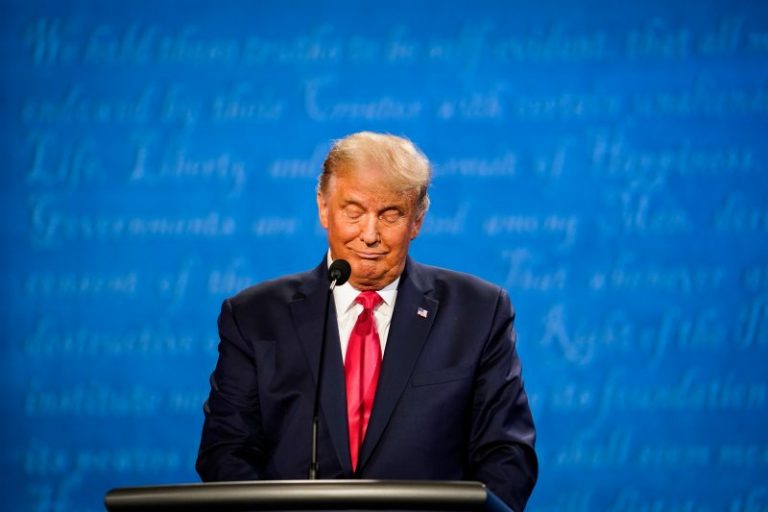Every four years now, we go through this. Donald Trump runs for president. Donald Trump balks at participating in debates. The wheel of life takes another turn.
On Wednesday, the former president spoke with a reporter from Reuters and formalized our arrival at a customary benchmark in his candidacy. Asked if he would participate in the first presidential primary debate in late August, he replied, “possibly not.”
What a shock.
He’s been telegraphing this for some time, of course, as he usually does.
There was his social-media post on Monday in which he suggested that he would skip the debate because its host, Fox News, was overly friendly to a rival candidate, Florida Gov. Ron DeSantis.
The channel, he said, “wants me to show up and get them ratings for their ‘Presidential’ Debate, where I’m leading the field by 40 points,” he wrote. “All they do is promote, against all hope, Ron DeSanctimonious.”
That followed weeks of similar rumblings: I’m so far in the lead, why should I bother?
There’s lots of precedent here. Back in 2015, when Trump first announced his candidacy, he quickly surged to the front of the Republican field. During the first debate that August, he immediately faced tough questions from Fox News moderators. He swatted them away easily, helping to cement the support of his base.
The ratings for that debate were huge. Trump almost immediately began trying to leverage that success, sending a letter to the president of CNN suggesting that proceeds from advertising an upcoming debate be donated to veterans’ charities.
A letter to @CNN President Jeff Zucker- pic.twitter.com/HKUYv9tFRm
— Donald J. Trump (@realDonaldTrump) September 9, 2015
A few weeks later, he modified his request: Since he was driving all that interest, maybe he should get a cut. Eventually, he dropped the idea.
Then came another Fox News debate, scheduled for January 2016. Trump’s putative frustrations with the channel emerged once again and, this time, he actually skipped it. Instead, he held a rally in Iowa where he raised money for veterans — money that was only distributed after The Washington Post began asking questions.
Once voting got underway, Trump’s irritation with the process continued — particularly as it became more clear that he would prevail. By March 2016, his indifference to debating was palpable and, sure enough, he simply declined to participate in the last scheduled debate of the cycle.
He was generally amenable to the general-election debates that year, though he insisted that he’d won when polling consistently showed that he hadn’t. It didn’t matter, obviously; thanks to the electoral college, he won the presidency.
In 2020, he had the Republican Party’s assistance in avoiding primary debates entirely. When the general election rolled around, he was back to his old approach. Despite his recent diagnosis of covid-19, Trump refused to do the debate virtually, so the commission that hosts the general-election debates called it off. Since then, the Republican Party opted to leave the commission, claiming that it was “biased.”
So here we are. Fox News is going to host a debate; Trump is balking. Same old, same old.
It’s important, though, to recognize why Trump holds this position. It’s simple, comporting with the mechanics that have driven his decision-making during the decades he’s been a businessman: The debates are not valuable to him — but they are to his opponents.
To the first point, the debates have never been valuable to Trump. After all, what do they offer? Visibility? The guy came into politics as a celebrity. The opportunity to advocate for a policy position? Sure, that’s something Trump’s worried about. You know Trump, the guy who is eager to dig into his wonky plans for government spending. He has been the head of a private corporation for decades. He is a monarch in his kingdom. Do you think that has involved a lot of spirited debate or pushback? There is an institutional importance to the debates, of course, but, again, respect for the traditions surrounding the presidency is not a hallmark of Trump’s political career.
The debates after that first one in August 2015 only introduced potential cost. As when he was asked about America’s nuclear arsenal and completely bombed (pun intended) on the answer — something that pretty clearly lingers in his memory.
Bringing us to the second point: The debates offer more value for his opponents. They need the visibility. They want to have a platform to throw punches at him, however pulled those punches might be. This year in particular, he is in the lead, by more than he ever was in 2016. From the standpoint of his campaign team, why should he present himself to the electorate in a debate format?
That the debates generate revenue for cable-news channels no doubt galls Trump. It’s his brand that’s helping to draw those millions of dollars (as he sees it), and he doesn’t see any of it.
At the same time, though, he recognizes that this gives him leverage. He can pressure Fox News, as he did successfully in 2016, to respond to his claims about their coverage (here, of DeSantis) and to frame Fox News (or other debate hosts) as biased against him. Fox very much wants the debate to include Trump and Trump knows it. So what can he extract?
Trump’s politics have always been far more transactional than traditional. His approach to the debates is the perfect manifestation of that. So here we are once again, back at the skipping-debates point on the wheel.

